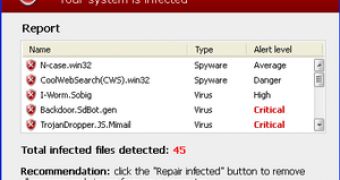Authorities in Belarus say they have completed their investigation into a massive cybercriminal ring that’s believed to have stolen $18 million (€13.2 million) with the aid of malicious software. It’s said the group made over 200,000 victims across 125 countries.
According to investigators, cited by Belarusian news agency BelTA, the cybercriminal ring was involved in cyber theft, disruption of data and applications, and the development of malware.
Four individuals from Belarus, with an average age of 25, have been arrested. One of them is believed to be the leader of the criminal enterprise. He created sort of a social network where over 100 criminals from various countries collaborated on cybercrimes.
Ivan Sudnikovich, an investigator of the Information Security and Intellectual Property Crimes Section of the Central Investigation Office of the Investigation Committee of Belarus, says the cybercriminals used fake antiviruses to make money.
In addition to fake antiviruses, they made millions of dollars by using credit card data to steal money from bank accounts. During a four-month period, between January and April 2010, the crooks stole $18 million (€13.2 million) from 200,000 victims located all over the world.
Their pieces of malware are believed to have infected over 500 million devices.
“Many users did not pay money, they reinstalled their operating systems. Other users paid up,” said Alexander Sushko, head of the Information Security and Intellectual Property Crimes Section of the Central Investigation Office of the Investigation Committee of Belarus.
Each member of the gang was paid depending on his contribution. Some allegedly received as much as $600,000 (€441,000).
The leader of the group was detained in Kiev, Ukraine. Police seized five cars from his garage, each worth over $100,000 (€75,000). An apartment in Kiev was also seized.
Authorities say it took them this long to investigate the case because of the large number of victims. The fraudsters face up to 15 years in prison.

 14 DAY TRIAL //
14 DAY TRIAL //